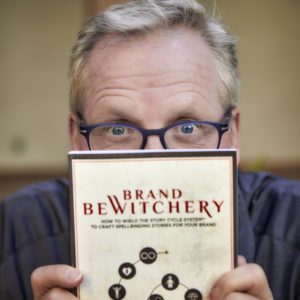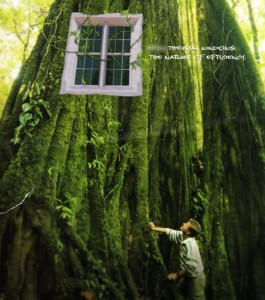I was asked to undertake a difficult project, which turned out to be a great gift. The CEO of a multi-national, two-billion-dollar-plus corporation requested a speech to open several company conventions around the world. These “Rallies” are often attended by upwards of 20,000 company distributors, and typically hosted in their native language. So not only did his story need to be compelling, but it also had to embrace a common human theme so it would be relevant the world over.
Please slow down, take five minutes, and let me know how this story touches you.
“Art Without a Frame”
I have what I think will be a new word for you today. It’s “Koyaanisqatsi.” (koy – yawn – ee – skot – see) The Hopi Indians of Arizona use this term to describe a “Life out of balance.”
The Hopi’s philosophy of life balance was also the theme for a Francis Ford Coppola film in 1982 about the frenetic speed of modern life. There was no script in this movie. No actors. Just the beautiful music of Philip Glass playing to film clips of modern day life sped up to represent our hurried existence.
And what have we done in the past 28 years since the debut of Koyaanisqatsi? We’ve sped up to a pace that is so great today, that I ask myself how many roses are going un-smelled? How many smiles are going un-given? How many moments are going un-appreciated, un-shared?
More recently, this drama unfolded at a subway station in Washington DC. Have you ever heard of the acclaimed violinist, Joshua Bell? He was a one-time child prodigy, and now, in his early forties, Joshua Bell is filling concert halls with his magnificent violin virtuosity accompanied by his striking good looks.
The Washington Post Magazine decided to do a social experiment. They wanted to see if beauty would transcend a cold setting of a Metro station at an inconvenient time for people on the go.
They asked Mr. Bell if he would pose as a street musician and play his magnificent music. The Post wanted to see what would happen to commuters when they bumped into a virtuoso like Bell during the course of their busy lives. Joshua gladly agreed, dressed down to fit the part of street musician, including a baseball cap that partly shaded his celebrity. Juxtaposing his common man demeanor was his $3.5 million Stradivari. And, for the next 43 minutes, the remarkable pieces by Bach, Schubert, Ponce and Massenet poured from his violin.
The greatest concern of the Post was crowd control. They were certain a “cultured” city like Washington DC would stop to listen to such great music, even as they stumble upon it in a Metro. Yet, few did stop.
For 43 awkward minutes, Joshua Bell, one of the finest classical musicians of our time, a man who fills $100-dollar-a-ticket concert halls to capacity, played his heart out to a seemingly uncaring – or perhaps unaware – crowd busily getting on with their lives.
During his “Subway” performance, 1,070 people hurried by. Twenty-seven people gave money – most of them on the run – totaling $32 and change. Only seven people stopped to listen. And one of those actually recognized him. She commented later that she was astonished, and “blessed,” to have happened upon Joshua Bell and his brilliance just sawing away in the subway. She had seen him in concert three weeks earlier.
Can you imagine what Joshua Bell felt like performing in that Metro that day? The indifference he experienced toward his God-given abilities: Gifts he was freely sharing.
Do you ever feel like Joshua Bell? After all, you ARE a virtuoso in your own right. You bring to this world remarkable talents that are uniquely your own. But do you sometimes feel they go unnoticed?
Now ask yourself what you would have done if you were one of those commuters? Would you have stopped and heard the music? Or would you have just blown on by, like 99 percent of them did?
Every time you turn away from a person, or choose to pass by without a care, you miss a work of art – Art that is literally unframed and out of context to you. You see, the real lesson learned in the Washington Metro is not that these people didn’t necessarily care about Joshua Bell and his performance.
Sociologists and art critics that have studied this phenomenon agree that people didn’t engage with Joshua Bell because he was playing out of context. Had those commuters known that they were passing up a free front row seat to one of the world’s premier classical performers, the crowd would have been decidedly larger, and probably poured out into the streets of DC.
We happen upon Joshua Bells every day in our hectic lives, and we typically don’t slow down long enough to recognize them.
- They come in the form of strangers who desperately need our products for better health, but just don’t know it.
- They are the ones too frustrated about un-reconciled dreams, or distracted by mounting debt, and they are blinded to the promise of Forever.
- They are the potential new Diamond Manager in your group that looks, for now, like the harried housewife.
- They are the neighbor that lost his job.
- The janitor that knows there is something more in him and this world.
- They are the misunderstood. The loud. The shy.
- They are every new face you happen upon every day.
Say hello. Smile. And share yourself… As you know now, you have many gifts to offer.
With Forever, we often focus on health and wealth. But like a great composition by Bach, these are but our initial themes.
You, as an instrumental part of the Forever family, offer more…
You offer belonging in this unsettling world. You can bring community and caring to those who feel alone.
You offer a sense of personal worth. Most people feel devalued these days: just another number in a tumbling economy. Forever provides a new beginning, a celebration of the individual, and with it, greater self-esteem.
You offer a brighter future through structure, guidance and productivity.
You offer personal growth; the unbinding of the corporate shackles that sets free the inner entrepreneur. And with it comes the gift of discipline.
You offer grand adventure by encouraging your peers to step out of their comfort zones and daring them to lead the lives they dream of.
You offer truth.
Every person, every stranger, every passerby you come across from this moment forward, is an unframed work of art. Take the time to peer into their eyes, and ultimately their souls, and learn how you can bring beautiful music to their lives. Then play like Joshua.
One final thought. Did You know the first piece Joshua Bell played that cold January day in the Washington DC Metro was Bach’s “Chaconne,” Partita No. 2 in D Minor for solo violin? Bell called it,
“Not just one of the greatest pieces of music ever written, but one of the greatest achievements of any man in history. It’s a spiritually powerful piece, emotionally powerful, structurally perfect.”
This remarkably difficult, 14-minute piece was written in 1720, on the eve of the European Enlightenment. Music scholars agree that it is a celebration of the breadth of human possibility.
So take a moment, close your eyes, and listen to a portion of this marvelous work, while picturing your “Life in balance.”
“Koyaanisqatsi.” (koy – yawn – ee – skot – see)












at 11:23 am
[…] This post was mentioned on Twitter by Park Howell. Park Howell said: Your story, no matter how beautiful, is lost when told out of context. http://bit.ly/dnNIGy […]
at 4:17 am
Likewise, this blogpost goes hardly noticed in the vast sea of blogposts endlessly flowing through the cyberwebs. This certainly strikes a very beautiful cord within me.
at 5:30 am
Thank you, Jonathan, for taking the time to stop and notice. I appreciate your kind words.
at 8:47 am
[…] when the Washington Post recruited one of the world’s finest violinists, Joshua Bell, to dress like a street musician and fiddle in the metro to gauge people’s responses. Or how about in 2010 when […]